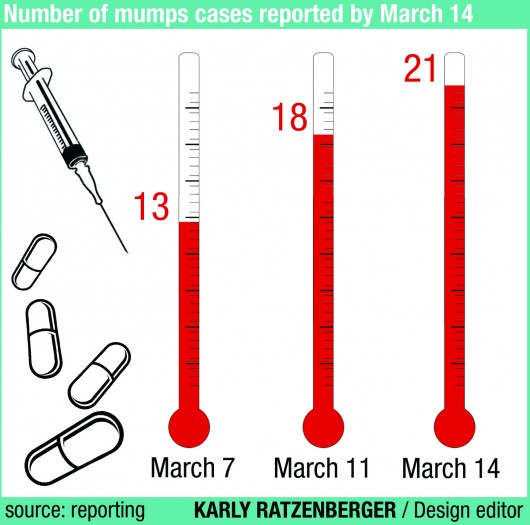With 21 cases of mumps reported at and around Ohio State, students are being advised that a vaccination will not completely guard them from infection.
Jose Rodriguez, spokesman for Columbus Public Health, said Saturday 21 cases had been reported as of Friday.
“Seventeen are OSU students, one is a staff member, one is a family member, and two have community links to OSU students,” Rodriguez said.
Mumps is a viral infection of the salivary glands, according to the Centers for Disease Control and Prevention website. It can spread through coughing, sneezing or contact with saliva or mucus.
Those affected by mumps might have swollen and tender salivary glands under the ears or jaw on the side of the face, fever, headache, muscle aches, tiredness, loss of appetite and inflammation of the testicles in men, according to the CDC. The website also says there is no specific treatment for mumps, but it is usually gone in a week or two.
Rodriguez said notices have been issued to health departments across the country because many potential carriers left Columbus for spring break.
“We’re hopeful that students will come back healthy and safe, but because there is a (15 to 25 day) incubation period, we know there is a possibility that we’re going to see new cases,” Rodriguez said.
Rodriguez said those who have received two doses of the measles, mumps and rubella vaccine still have a 10 to 20 percent chance of being infected.
Rodriguez called the group of cases in the outbreak “highly vaccinated,” meaning most of the people had their vaccinations.
“Even within folks that are vaccinated, they are still at risk of illness,” Rodriguez said.
OSU students are not required to get an MMR vaccination unless it is a specific requirement for their program, as is the case for some medical programs, according to the Student Health Services website. Students interested in a vaccination are able to receive one through health services after a screening.
Rodriguez said students who have not been vaccinated should seek vaccination immediately, but he said every student needs to practice “common sense” and take precautions.
“If you’re sick, you need to be isolated,” Rodriguez said. “You need to wash your hands, cover your coughs and sneezes, and especially stay home if you’re sick … don’t share personal utensils, cigarettes, drinks.”
Rodriguez said one-third of those infected with mumps are just carriers who don’t show symptoms of the disease.
“(Carriers) don’t get a chance to isolate,” Rodriguez said.
He said those infected at OSU have been encouraged to isolate themselves.
OSU spokeswoman Liz Cook said in an email Friday OSU has a plan to defend students from mumps.
“In anticipation of classes resuming and students’ return to campus, the university will be working proactively — broadening its communications efforts and heightening awareness to keep students informed, lessen the risk of infection through proper hygiene practices and, in the event of illness, where to get medical treatment,” Cook said.
Cook said OSU is working with Columbus Public Health and the CDC to investigate the cases.
Rodriguez said OSU has been sending samples to the CDC for testing.
“It does take a little longer (to send them to the CDC) … but accuracy in testing is critical and really important to any investigation like this,” Rodriguez said.
The university sent an official statement and answers to some frequently asked questions in Sunday’s Buckeye Net News newsletter, which Cook said is sent to all students. She said similar messages would be sent to faculty and staff.
OSU also plans to leverage its health-related social media and deliver posters to on- and off-campus locations to encourage healthy habits, Cook said.
There was recently a mumps outbreak at Fordham University in New York, with 13 suspected cases reported as of Feb. 21, but Rodriguez said there is no evidence of a connection to the OSU outbreak.
Rodriguez said epidemiologists will say when the outbreak is over in a public statement. The outbreak will be considered over once there are only one or two cases in the community and that number holds for a certain number of weeks, Rodriguez said.
For now, the most Columbus Public Health can do is connect as many cases as possible, Rodriguez said.
“We are … contacting every (infected person) immediately so we can start gathering information as soon as we can, and start putting the puzzle together,” Rodriguez said.
Haiwei Su, a fourth-year in applied mathematics, said he is focusing on staying healthy.
“You’re pretty safe as long as you don’t have exposure,” Su said. “I wash my hands … just focus on my own hygiene.”
Stephen Zhou, a third-year in marketing, said there was concern about the outbreak while he was in Florida on a Buck-I-SERV trip through OSU.
“Our adviser (on the trip) said to pay attention to symptoms while we were there,” Zhou said. “Luckily, nobody had any symptoms.”
Robert Maupin, a fourth-year in logistics, said he had cold-like symptoms over the weekend, which worried him because he knew about the outbreak.
“But it ended up being just a cold,” Maupin said.
Maupin said he is not vaccinated for mumps, but he isn’t concerned about catching it.
“I probably wouldn’t turn down a vaccine if I was offered it, though,” Maupin said.



